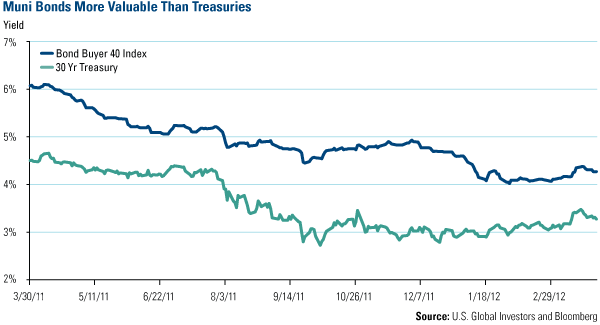The Economy and Bond Market Radar (April 2, 2012)
Time to Pay the Piper
If you haven’t filed your 2012 federal income taxes yet, the clock is ticking. Beginning Monday, you will only have 11 business days to get them in by the filing deadline of April 17, 2012.
Like many nationwide debates, Americans are nearly split down the middle when it comes to taxes. Recent data from Gallup shows 50 percent of Americans believe federal taxes are too high while 43 percent believe they’re about right. Note: the responses are “about right” and “too high;” I don’t believe there are many in the “should be higher” camp. However, after 11 years of the Bush Tax Cuts, it looks like America’s tax rate structure will shift upwards next year. Five of the six tax brackets will increase with the largest earners paying nearly 40, up from 35 percent currently.
One way investors can offset higher tax rates is through municipal bonds. In general, interest generated from municipal bonds is exempt from all federal income taxes and some state and local taxes (depending on your state).
While municipal bonds carry a greater amount of risk than Treasury bonds, tax advantages and higher yields make them extremely attractive to Treasuries on a relative basis. The yield on government debt is currently in the doldrums just above 3 percent while the yield on the Bond Buyer 40 Index of munis is above 4 percent.

This gap gets even greater when you consider tax exempt income. The tax equivalent yield on a taxable investment (such as U.S. Treasuries) would need to be more than 6.5 percent in order to outpace the muni bond index cited above. This means the yield on U.S. Treasuries needs to roughly double from its current level in order to be attractive to munis on a relative basis.
If you’re one of those investors writing Uncle Sam a big check this year, you should consider adding tax-free bond funds to your portfolio. Explore our Near-Term Tax Free Fund (NEARX) and Tax Free Fund (USUTX). However, investments and tax planning is complicated and each investor’s situation is unique—you should consult a tax advisor to determine whether or not muni bonds are right for you.
This information does not constitute tax advice and is provided for informational purposes only. Please consider speaking with a legal or a tax adviser regarding your individual situation.
Strengths
- February durable goods orders in the U.S. rose 2.2 percent, bouncing back after a weak January.
- German unemployment fell to 6.7 percent in March and to the lowest level since reunification in 1990.
- Japanese retail sales rose 3.5 percent in February, well ahead of expectations and the best growth since August 2010.
Weaknesses
- With rising gas prices lifting inflation concerns and dragging down future expectations, the Consumer Confidence Index fell in March.
- Pending home sales were expected to increase in February but data released this week showed a decline.
- Initial jobless claims edged higher this week but nothing too concerning just yet.
Opportunities
- Bonds have staged a rally the past couple of weeks as investors reassessed the global growth outlook. As long as China is comfortable with slower growth, that trend appears likely to continue.
Threats
- Rising oil and gasoline prices combined with liquidity implications of global easing may raise the prospect of reappearance of higher inflation going forward.








